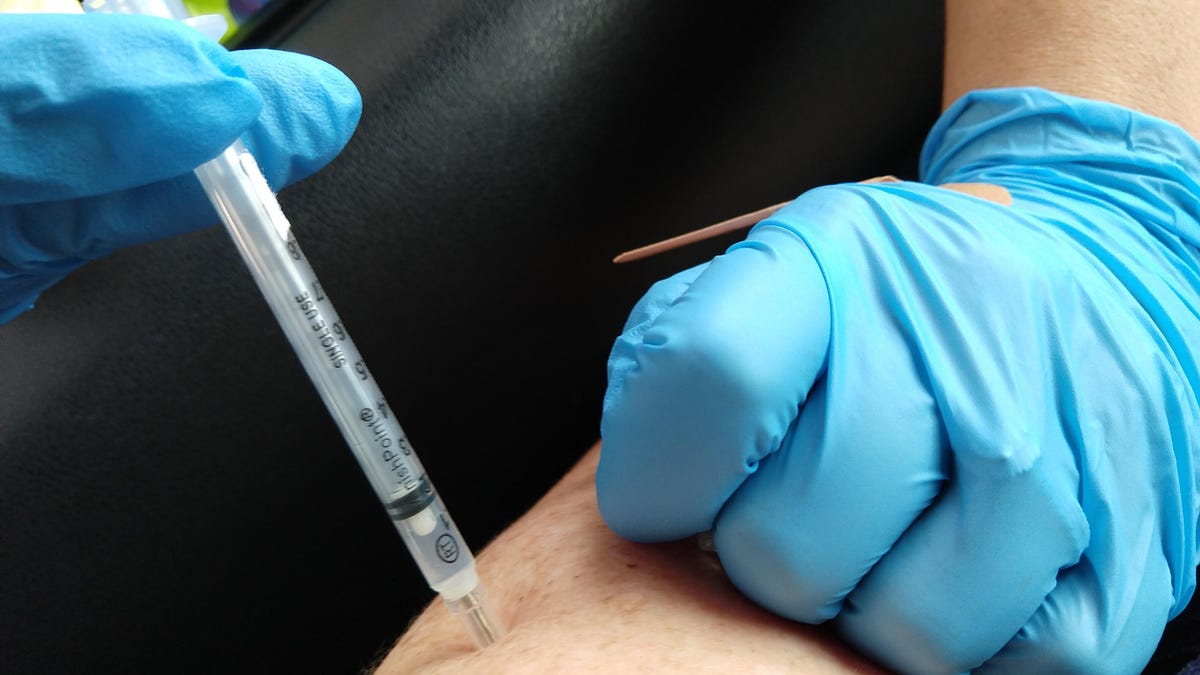How to overcome a fear of needles to get your COVID-19 vaccine
Tips from a nurse and a psychiatrist for an easier appointment.

A Pfizer injection at a mass vaccination site in March at the Circuit of the Americas racetrack in Austin, Texas.
Scared of needles? You're not alone. Trypanophobia, the medical term for extreme fear of needles, is nothing new. It's like any other phobia: It could be rational or irrational, but the fact is, it exists and can make necessary life scenarios feel impossible.
Dr. Jeffrey Ditzell, a New York-based psychiatrist, says trypanophobia is relatively common -- it affects an estimated 20 to 30% of adults -- but health care professionals have experienced an uptick in day-to-day cases due to the influx of patients eligible for COVID-19 vaccines.
Some people may even completely avoid the COVID-19 vaccination due to their fear of needles, a troublesome situation because more people need to get vaccinated to reach herd immunity.
While needles are no big deal to most people, those with trypanophobia can experience extremely unsettling symptoms, including sweating, tremors, racing heart rate, dizziness or even fainting, Ditzell says.
"The underpinnings of this fear likely have a protective biological basis, [such as the] adaptive value in avoiding sharp and potentially dangerous things," Ditzell explains.
So how can you get through your COVID-19 vaccine appointment without letting your fear of needles get the best of you? Try these tips from Ditzell and nurse practitioner Esbe Duncan.
Mindset techniques for overcoming a fear of needles
Focusing on the positive of any situation helps.
Ignore the misinformation about the vaccine. Duncan says she believes much of the needle anxiety about the COVID-19 vaccine is related to unfounded myths about the vaccination, such as that the injection implants a government-monitored microchip into your arm. Ignoring this misinformation -- or better yet, studying up on the facts -- can diminish the phobia if it's primarily related to vaccine myths, Duncan says.
Try to focus on the positives of the process. "Imbuing any task, however unpleasant, with personal meaning can change the mundane and uncomfortable to something satisfying and positive," Ditzell says. Remember that by getting the vaccine, you are protecting yourself and people you love from falling ill with a deadly virus. Being vaccinated also means you can follow the Centers for Dis's new guidelines for vaccinated people, which includes gathering in small groups. Think about how great it will be to visit your friends and family without fear of catching or spreading COVID-19!
Thinking about fulfilling your social responsibility to others. This will help provide context to the situation and can make you feel more determined to get the vaccine despite fears. Leading up to your appointment, remind yourself that your vaccination means the world is one step closer to the end of the pandemic and being able to safely enjoy pre-COVID-19 activities again.
Day-of tactics for an easy appointment
Don't be scared to voice your fear to the nurse giving your injection.
Overcoming a phobia is as much about practicality as it is about mindset work. On the day of your COVID-19 vaccine appointment, try one or a few of these tactics for reducing fear and anxiety.
Eat and hydrate before your appointment. This will help reduce feelings of dizziness and faintness, Ditzell says. Arriving at your appointment hungry or dehydrated can compound the negative effects of stress and fear.
Request a numbing agent. When it's your turn to get vaccinated, ask if you can be provided with a topical anesthetic at the injection site. Most clinics should have numbing agents on-hand, and a quick swipe of lidocaine could quickly ease your fear if your phobia is pain-related.
Ask your nurse to breathe with you. Don't be afraid to voice your fear, Duncan says. The person giving your injection will likely be happy to help you practice deep breathing and even do it in sync with you. Deep breathing is proven to reduce anxiety and can provide a feeling of stability and comfort in an unpleasant situation.
Picture your favorite place. Along with deep breathing, close your eyes and picture the sun on your face or think about some place or thing that soothes you. "Usually, even with the worst cases, breathing and imagery together work" to soothe anxious people, Duncan says.
Look away from the needle. This sounds like common sense, but those who are scared of needles may find it hard to look away in the moment. Ditzell says this is one of the simplest yet most effective tactics for reducing fear during an injection.
Imagine alternate scenarios. When you look away or close your eyes, visualize something that elicits a similar feeling, but is not as scary. For example, you could visualize your friend pinching your arm in excitement to tell you a secret or a big story, instead of thinking about the needle. Another idea is to picture a mosquito bite (as long as you're not scared of mosquitoes).
Oh, and definitely listen to a COVID-19 vaccine hype playlist on your way to the clinic.

